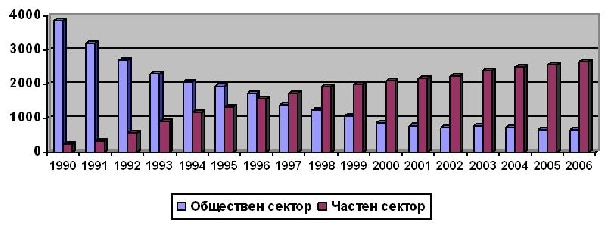The Labor Force and the “Import” of Workers
There are a lot of talks recently about the shortage of labor in Bulgaria and the possible import of workers from abroad, which must fill the free job openings. It is important to clarify what causes this problem and what are the consequences from it and what could be done in order to satisfy all sides of the question.
For the reduction of the labor force there are three main reasons:
-
Natural Growth. During the last few years there is visible reduction of the natural growth of the population, it is observed and this is caused mainly by the reduction of the birth rate in the country. The result is aging population, when we take into account the increased duration of the human life. Similar problem exists in the countries of Eastern Europe and the countries from the former Soviet Union. Some of the concerns about this problem relate to the greater costs for healthcare, because the cost for the elder are higher, however, the pure logic suggests that the people live longer because they are in a better health – today they get better food, better working conditions, better healthcare system, and higher standard of living. On the other hand the reduction of the birthrate is a result of greater employment of the women, as well as the better education of the population as a whole. More and more families decide first to earn enough funds to be able to raise their children and to provide them with better education. The coefficient of employment particularly that of the women is growing. Combined with the smaller number of people in the economically active group, the unemployment is significantly smaller.
-
Migration of the Population. Particularly during the early years of the transition in Bulgaria, the migration processes affected significantly the number of the population. Migration is the expression of the personal desire of the people, caused by the lower wages, greater insecurity and the high unemployment. On the other hand this process is reducing the population in productive age, because migration is mainly for people who fall into this category, however, on the other the process is connected with positives as well such as exchange of experience, knowledge and the funds which the emigrants continue to send to Bulgaria. We should not overlook the internal migration of the population – from the villages towards the cities, which leaves a lot of free working places in the province. This is all a result from the choice of the individuals and it should not be neglected or prosecuted.
-
Growth of employment and the development of the economy. The third factor, which causes a labor shortage, is the development of the economy and the opening of more jobs. This connected to restructuring of sectors and production, privatization, liquidation of ineffective production and activities, as well as from opening of new activities. The reasons for this trend are the multitude of radical reforms, directed towards the building of civic society and market economy. An increased number of people are being employed by the private sector, while the numbers employed by the public sector is being reduced. The measured employment increases also due to some activities getting out of the "gray" sector, as a result of better market conditions and tax policy.
Persons employed by the private and public sectors (thousands)

Source: NSI
The result of all of the above is increase in the wages, where these in the private sector are higher (although the official data of the NSI indicate differently). The public sector is characterized by a large number of employed, but with lower salaries, which inevitably leads to lower productivity of labor. In the private sector the resources are greater, the salaries are higher and the productivity is greater. The increase of the salaries and the fewer seekers of jobs lead to bankruptcy some companies, which do not have the resources to retain their employees and could not respond to the increased wages. Another effect is the replacements of the sectors with low productivity (and a large number of employees) by those which create greater added value. Thus the employers complain about labor shortage in the country and insist on "import" of workers from a broad expecting to have lower costs. They are even preparing a strategy related to encouraging circular migration – the idea is to attract foreign employees for just 12 months. They are unlikely to create unfair competition to the Bulgarian applicants for work, and it is more likely that the employers would prefer Bulgarian workers since a worker who knows that he would be working at a given place only 12 months, may not have enough stimuli to develop and grow within the hierarchy. Besides that the legal foreign workers most likely will be more expensive – the employers will have to cover a lot of expenses, such as transportation, rent of living quarters and the cost of integrating the foreigners. This makes unnecessary all strategies. The employers must themselves define what kind of worker they need and from where and how they could get them. In a functioning market, this of the labor, it is not necessary for the state to interfere with the demand and supply of the labor force.
During the process of development of the economy, connected to the higher standard of living and the gradual increase of the salaries, increased education and qualification of the population and economic reforms, the market itself will sort out the problem, if there is such. The improvement of the business environment will attract immigrants, will reduce the outflow of qualified specialists and will lead to increase in productivity.


